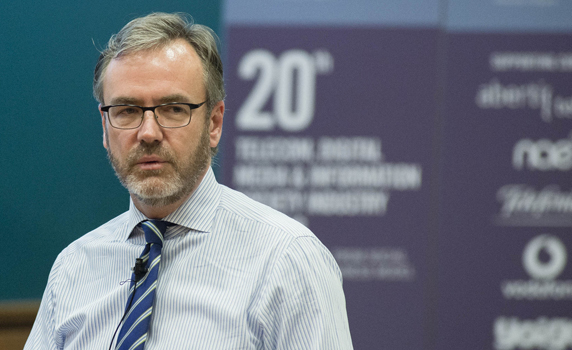
Health, education, media, insurance, finance, public sector, tourism, transport, automotive, communications – no sector is safe from digital disruption. Faced with this new paradigm, the IT sector (telecommunication companies, digital media firms, and technology suppliers, among others) and other businesses are struggling and competing to capture some of the enormous value that is being generated.
This was made clear at the 20th Telecom, Digital Media and Information Society Industry Meeting held this week on at IESE’s campus in Madrid.
Capturing value in the new ecosystem
Under the academic direction of IESE professors Joan E. Ricart and Josep Valor, as well as Santiago Miralles, the meeting discussed the changes that are occurring in the value chain. Specific examples of new business models and the challenges that the digital era presents were also addressed.
Michael Jacobides, professor at the London Business School, said that the key is to “differentiate” yourself from the rest of your competitors in the value chain. “Companies have to set out to be different and unique. Those that do will have many followers,” he said. To achieve this, they need to seek an intelligent design and a business architecture that allows them implementing this strategy.
“In Europe, we are not yet capable of generating digital ecosystems that suit all of the value chain levels,” lamented Benigno Lacort, director general of AMETIC. He warned that the value is moving towards the United States and Asian markets. “We must try to recover the lost leadership and accelerate the digital transformation of economic sectors that are at a technological remove,” he added.
Alberto Moreno, an executive at Telefónica Spain, agreed and said the European telecommunications sector needs to be transformed if it is not to miss the leadership train. “Despite the explosion in traffic caused by the regulatory focus on prices, Europe is the only region where income in the sector is falling,” he said.
“Value is being destroyed in the mobile phone sector,” highlighted Gabriel Míguez, director general of strategic business development at Yoigo. Pedro Peña, a Vodafone executive, went further. “The Internet is having a disruptive and very dangerous effect on telecommunications companies,” claimed Peña. He said the solution was to establish a dialogue between all of the operators and other players involved within a regulatory framework that establishes equal norms for everyone.
New players and business models
One of the consequences of this digital tsunami is that the people driving the change are not necessarily traditional IT players.
Google is a good illustration of this. In September 1998, the company launched its Internet search engine based on algorithms. It now has a turnover of almost $60 billion and is much more than the most widely used search engine: it also offers blogs, books, e-mail, instant messaging, videos, a social network, advertising services, operating systems and devices. Furthermore, it is embarking on numerous projects that until recently would have been science fiction, such as Google Glass and driverless vehicles.
Another consequence of this technological evolution is that the traditional value chain is developing into a complex network of relationships, known as the “IT ecosystem,” where new agents and players with different functions are intervening with a shared objective: to create and capture value, said Pere Rosell, director of AECOC.
Airlines are a clear example of what is happening. Samuel Lacarta, head of technology at Vueling, said that for some years now the Internet has been the main sales channel for airlines and that all strategies are developed with the Internet in mind. “We have a lot of information about how our travelers and users surf our web page. This data is very useful because it allows us to segment and personalize messages and offers, among other actions,” said Lacarta.
Big data was the focus of the comments made by Fuencisla Clemares, sales director of Google Spain. “Data is essential for optimizing business and having a better understanding of the consumer. Companies that don’t know how to interpret this information are lost causes. It is necessary to invest in analytical capacity,” she said.
“The banking sector isn’t untouched by digital transformation either,” said Ignacio Bernal, head of innovation and development at BBVA. In Spain, between fifty and sixty percent of clients of financial bodies are already digital. He believes it is necessary to accelerate within the digital space because, faced with ferocious competition, only the best will survive.
New media, content and advertising
The media and content industry is one of the sectors most affected by digital changes. Prof. Valor said that the Internet has already consolidated itself as the second medium by volume of advertising investment. Printed newspapers are at the opposite end of the spectrum, with investment levels falling to that of the 1950s. That’s why it is fundamental for media to adapt their strategies to the new reality if they want to survive.
The executive director of CBS News and IESE executive in residence, Steve Capus, said it is fundamental for media companies to employ professionals who are “capable of generating business.”
Capus reminded his audience what happened a few years ago at The New York Times, when it announced its “pay wall” for digital content. “When someone launches an initiative like this, how can they justify it? By offering unique content and specialized analysis that no one else can offer,” he explained.
Facebook’s Arturo Martín emphasized the importance of mobility. “Eighty percent of Facebook users are on mobile and in the United States smartphones have reached a bigger audience than television for the first time, with all that implies for brands,” he pointed out. No wonder that the media is one of the sectors that has been most affected by the technological revolution.
The secretary of state for Telecommunications and the Information Society, Víctor Calvo-Sotelo, closed the meeting. “An advanced economy needs a robust and innovative sector,” he concluded.